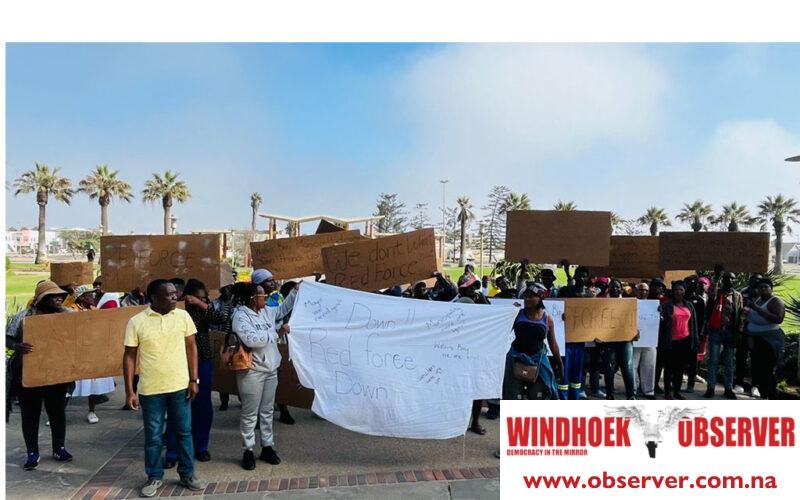Ester Mbathera
Residents of Walvis Bay have resorted to unconventional methods to collect money to clear their debt to the harbour town’s municipality.
Two women shared their ordeals with the Windhoek Observer on how they paid their water, as well as rates and taxes after they were disconnected by debt management company RedForce recently.
While the Windhoek Observer is aware of their identity, it was decided not to disclose their names in order to shield their families from the potential consequences of public condemnation.
“I am not able to look my husband in the eyes because of what I did to get money to pay our water bill. I don’t know what sort of people our councillors are that they have to subject us to this humiliation. I slept with a man who gave me N$8,000 to pay our bill. People from the RedForce would not listen to us. They demand that we pay at least 60 to 70 percent of our bill. I tried to explain my situation and that I have not been able to secure a permanent job since I was retrenched during COVID-19 in 2020. We can’t get loans from banks because both my husband and I don’t have a steady income. My husband has been driving a taxi between Walvis Bay and Swakopmund since 2021,” explained one woman.
She fears that the person she slept with might want to demand more sex, which, according to her, would ruin her marriage.
“I don’t know how many other married women are doing the same out there. How do the elderly women in Kuisebmond and Narraville pay their bills? But I hope that our husbands understand when they read your article,” she said.
Another woman said she told her children that their water pipes burst to save face.
“I have never borrowed money in my whole life. But I had to. My husband was laid off, and he was responsible for our bills. The children saw the water meter was removed, but I told them the water pipe burst and the municipality is working on it. In the meantime, I went around to friends to borrow money to have the water reconnected. As a family, we are now considering moving into the backyard flat of our house and renting the house out,” she said.
She explained that the family owns three other properties, and her main house’s water was disconnected because of the arrears on the other two properties.
“They told us we were responsible for ensuring that the tenants paid their water bills. I was traumatised because RedForce didn’t call me to alert me to the other bills. Mind you, I am also being charged the monthly meter reading service of N$130 for each of the properties,” she said.
Community activist Knowledge Ipinge was also not spared from RedForce’s billing system.
“I was given a bill for property that I disposed of in 2015. There is a malfunction in the system, but they sorted it out. How everything is being done is evil. They don’t want to negotiate with people, they are just demanding their 75 percent down payment to reconnect the water. “The worst part is that they are punishing people for bills that were settled many years ago because the money is sitting in the municipality’s suspense account that has not been allocated until today,” he said.
Apart from the meter reading fees, the clients are charged a further N$60 for meter disconnection and another N$60 to reconnect.
The funds all go to RedForce, not the municipality.
Last week, the municipality announced that RedForce may no longer disconnect or reconnect municipal water services or conduct water meter readings in the town.
RedForce chose to take the matter to court. The municipality of Walvis Bay has enlisted the services of the Metcalfe and Beukes Law firm.
Agreements made outside the law
RedForce, local authorities, and some state-owned enterprises entered into agreements that might have been done outside the law.
This is because many of the contracts exceed the entities’ consultancy thresholds, according to the Public Procurement Act.
The entities, according to the act, should go out on tender if works exceed N$35 million, consultancy services N$20 million, and non-consultancy services N$15 million. It appears that the entities are in direct breach of Sections 6 and 58 of the Public Procurement Act.
When they are above the threshold, the entities must apply for an exemption. Some of Redforce’s clients and their book values:
Agribank N$113 million
City of Windhoek: N$400 million
Gobabis Municipality: N$90 million
Keetmanshoop Municipality: N$78 million
Omaruru Municipality: N$34 million
Namibia Airport Company: N$60 million
National Housing Enterprise: N$53.8 million
Social Security Commission: N$80 million
Oshakati Municipality: N$80 million
Katima Mulilo Town Council: N$145 million
Ondangwa Town Council: N$80 million
Rundu Town Council: N$370 million
Okahandja Municipality: N$50 million
The Central Procurement Board of Namibia (CPBN) spokesperson, Johana Kambala, said the board has not dealt with any tender related to debt collection.
“CPBN did not handle any procurement awards that have to do with debt collection by RedForce. Kindly reach out to the respective public entities to inquire how they awarded the bids, and if you are not satisfied with their responses, you may approach the Procurement Policy Unit under the Ministry of Finance and Public Enterprises (MFPE),” she said.
None of the public entities contacted have responded to the questions sent to them. MFPE spokesperson, Wilson Shikoto explained that where a public entity is procuring within its threshold, there is no need for a request for an exemption.
He confirmed that no entity has applied for an exemption thus far.
“At the ministry, we do not have a centralised database of all procurement conducted by all public entities. At this point, there is no recollection of an exception granted or requested in relation to the subject matter,” he said.




